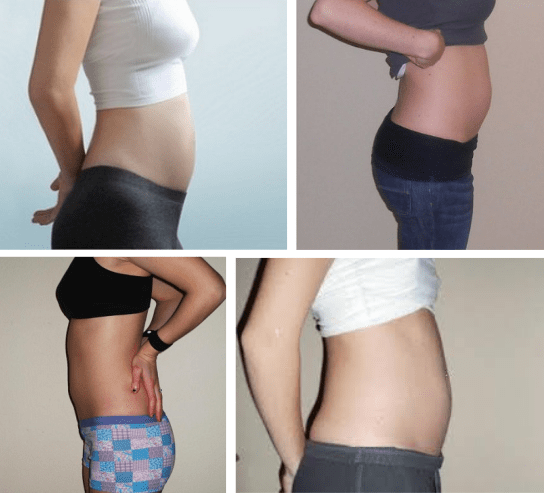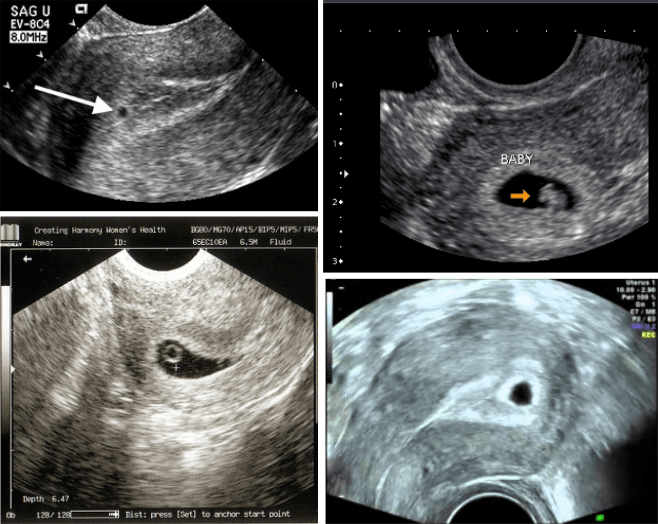If you are trying to conceive you might notice subtle differences in your body and want to know if they are symptoms or signs of pregnancy. But these little changes could be you thinking you are pregnant and noticing what has always been there, and you just didn’t pay attention to it.
Now, the symptoms are not the same for every woman, because everyone is different. Some women experience symptoms during the first month when they are pregnant, some women have no idea that they are pregnant, while others might not experience anything, but just kind of have a feeling they are.
So, knowing what to expect in the first month of pregnancy can be a challenge but throughout the article, you’ll find some things that might help you determine if you are pregnant or not that early on, if you are one of those who do experience any symptoms at all.

You can experience a range of symptoms from all of these, to none of these. But what you should know is that having emotional or physical symptoms from pregnancy is normal and unless it’s affecting your daily life, you shouldn’t have anything to worry about.
What Can You Expect In The First Month Of Pregnancy?
Implantation Bleeding
An embryo will attach to the uterus after conception, say anywhere from six to twelve days. This generally falls around the time of when you would expect your period. Missing your period is the first sign of pregnancy.
Some women experience implantation bleeding, which can be mistaken for menstrual bleeding. However, there are subtle differences that can help you tell the difference.
Implantation bleeding is lighter in flow than your regular period and should also only last from a few hours to about 3 days at the most. [1]
Fatigue
This is simply preparing you for life with a newborn. So corny jokes aside this is one of the symptoms that many women report and the first trimester (along with the third) seem to be the worst of it. Many will feel exhausted due to the changes in hormones, drop in blood sugar levels and blood pressure [2]. Being tired is normal, being exhausted is normal, even not being tired at all is normal too.
Tender or swollen breasts
This is one of those symptoms that might be more difficult to tell. Many women experience changes in their breasts during menstruation and PMS. While the first trimester causes breast changes, this one might not be as noticeable.
As you progress through the first trimester, this tenderness might increase. Just like other skin that will begin to stretch, your breasts are no different and may begin to itch as they get fuller. [3]
In some cases, the areolas, the dark area around the nipples, will become darker (which interesting fact, is to help your baby see them when they nurse). You might also notice that the small bumps on the nipple are more pronounced. The bumps actually produce an oily fluid in preparation for breastfeeding.
Morning sickness
The name is a bit of a misnomer. Morning sickness as it’s called is not limited to just morning and can last all day. For many, it’s the first sign of pregnancy.
Some will just feel nauseous while others will physically get sick. The only time to worry when it comes to this is if you can’t keep anything down, liquids and solids and that could result in a trip to the doctor or hospital. While for many it does ease up during the second trimester, some deal with it their entire pregnancy.
Frequent Urination
Get used to this one and to the bathroom because you will spend more time there the further along you get in your pregnancy. Blood flow to your kidneys increases, sometimes up to 60% [4], which means you will make more urine and have to use the restroom more. In the end, along with the increased urine, it’s also the addition of the child who uses your bladder as a seat (or a soccer ball).
Sensitivity to smells
If you also have morning sickness, this one could be a real pain. There’s no clear-cut answer as to why it happens and you have a superhuman smell (hypersomnia), but it could be that with the increased blood flow, things are moving through your body faster, and the receptors for smelling have increased [5]. Some also think that it could be a feature in your body to alert you to things that are bad for you, primal instincts we’ll call it.
Excessive saliva
This generally occurs in less than 3 percent of women and is also known as ptyalism or sialorrhea [6]. Both of which are associated with those who also deal with morning sickness because the more nauseous you are, the more you salivate. Chewing gum might help to diminish the symptoms a bit.
These are some of the most prominent symptoms that you might experience during the first few weeks/months of your pregnancy. While again, you might not experience any, you could have all of them or any range in the middle. So if you feel a bit off, the best way to determine if you are pregnant is to POAS (pee on a stick, for those who haven’t been on mommy/pregnancy boards, here is your first acronym). If you are pregnant, congratulations! And good luck for a healthy and happy pregnancy with as few symptoms as possible.
Belly Pictures in 1 Month Pregnancy
Here is how a belly might look like in the 1st month of pregnancy.

Ultrasound in 1 Month Pregnancy

Month 1 Pregnancy Video Guide
References
-
1. https://www.motherandbaby.co.uk/pregnancy-and-birth/the-difference-between-implantation-bleeding-and-a-period
2. https://www.familyeducation.com/pregnancy/signs-symptoms/first-signs-pregnancy




Comment Text*I did abortion on 4th October and it was successful when will my next period start??
Hello Chinyere, period cant start anywhere between 3-6 weeks. Up to 8 weeks for others.
Hi,I have 29 days cycle .I had an unprotected sex on 19 until 23 and on 24 may i was ovulating .and around 7 June I was supposed to have my period but it didn’t come .on 10 June I took pregnancy test and it was positive .Later on 27 June I had my period with severe pain .so on 06 july i took a pregnancy test it was positive and I did the ultrasound and the doctors said he cant see clear but it shows that I am pregnant but I must come after 3 weeks .so what confused me is that I can’t feel symptoms of pregnancy so please help me I don’t if I am still pregnant or not
I would recommend that you visit your doctor once more for a concrete answer.